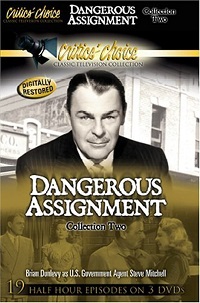
 “Yeah, danger is my assignment–
“Yeah, danger is my assignment–Dangerous Assignment (1949-53) aired “Words Are Mightier Than The Sword” on April 21, 1951. Since this is only the sixth episode of Dangerous Assignment we’ve offered since the first in February of 2018 and the second since March of 2019, a reprise of its background is in order for newcomers to the series. The show debuted on the NBC network in July of 1949 as a summer replacement and ceased in August after 7 episodes. It was popular enough with listeners and was picked up in February of 1950 to begin its almost 4-year run. It starred popular Hollywood actor Brian Donlevy (1910-1972) as secret agent Steve Mitchell, who was sent as an undercover foreign correspondent by an unnamed U. S. State Department agency on delicate assignments abroad where U. S. interests were involved. His only “agency” contact was “the commissioner,” who would read him in on the background of the situation and then send him off to various hotspots around the globe to rectify the situation. He was rather like an early James Bond character, but much more low-key and without all the gadgets, though the situations were very much in line with some of the problems a Bond character might face.
Dangerous Assignment proved popular enough (and through the savvy management of Donlevy himself) that it was given a television show that ran from late 1951 until May of 1952 and comprised 39 episodes. Donlevy himself led quite an interesting life with several SF genre connections, about which more in a moment. For his role as Sergeant Markoff in 1939’s Beau Geste he was nominated for a Best Supporting Acting Oscar, but lost. His career spanned the decades of the 1930s-1960s in both motion pictures (over 80 films), and television, where he played both good and bad characters in numerous popular shows. As to Donlevy’s pre-radio and film careers, in 1916 he answered the Wisconsin Army National Guard’s call to join the Pancho Villa Expedition, and though he was only 14 and lied about his age, he was accepted and served as a bugler. And during World War I he ended up in France with Company C, 127th Infantry Regiment, which was a part of the 32nd Infantry Division.
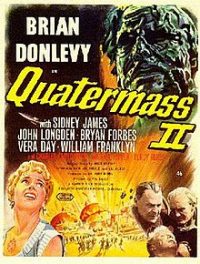
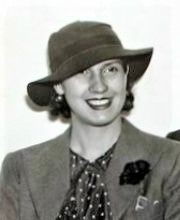 As to Donlevy‘s SF connections, there are two worthy of interest. He played the lead role of Professor Bernard Quatermass in the 1955 British film The Quatermass Xperiment (retitled The Creeping Unknown in the U. S.), then reprised his role as Professor Quatermass in the 1957 British sequel Quatermass II (poster at left, retitled as Enemy from Space in the U. S.). As to his second genre connection of note, it has to do with iconic early horror actor Bela Lugosi (1882-1956). It would seem that our Bela was either a ladies man or had trouble keeping them, for he was married five times. The total elapsed time of his marriage to four of his wives was a mere 8 years. The marriage to his fourth wife, however, was to be for 20 years to Lillian Arch. Lillian Arch (1911-1981) was 19 when they married, Bela was 51. They remained married from 1933-1953, at which time they divorced. A partial reason given for the divorce was Bela’s jealousy of Lillian’s close friendship with none other than Brian Donlevy, with whom Lillian worked on both the radio and television programs as a full-time assistant. Bela’s jealousy, warranted or not, ten years after Bela’s death in 1956, Brian would marry Lillian, the fourth ex-Mrs. Bela Lugosi. They would remain married until Donlevy’s death in 1972.
As to Donlevy‘s SF connections, there are two worthy of interest. He played the lead role of Professor Bernard Quatermass in the 1955 British film The Quatermass Xperiment (retitled The Creeping Unknown in the U. S.), then reprised his role as Professor Quatermass in the 1957 British sequel Quatermass II (poster at left, retitled as Enemy from Space in the U. S.). As to his second genre connection of note, it has to do with iconic early horror actor Bela Lugosi (1882-1956). It would seem that our Bela was either a ladies man or had trouble keeping them, for he was married five times. The total elapsed time of his marriage to four of his wives was a mere 8 years. The marriage to his fourth wife, however, was to be for 20 years to Lillian Arch. Lillian Arch (1911-1981) was 19 when they married, Bela was 51. They remained married from 1933-1953, at which time they divorced. A partial reason given for the divorce was Bela’s jealousy of Lillian’s close friendship with none other than Brian Donlevy, with whom Lillian worked on both the radio and television programs as a full-time assistant. Bela’s jealousy, warranted or not, ten years after Bela’s death in 1956, Brian would marry Lillian, the fourth ex-Mrs. Bela Lugosi. They would remain married until Donlevy’s death in 1972.
In this episode, Steve Mitchell’s government contact sets him up with an important assignment on the French Riviera where he is to safeguard the identity of the leader of a resistance operation during World War II who has been smuggling important personnages from behind the iron curtain to destinations inside free Europe. The brains of the operation is a famous Czech author the Nazis would dearly love to get their hands on, especially since the upcoming operation involves an atomic scientist who holds valuable intelligence into Germany’s progress toward making an atomic bomb. As can be expected, there is the usual spy vs. spy vibe to this dangerous enterprise and Steve Mitchell must tread carefully, employing all of his expertise and hard-won intuition born from past experience, for even the slightest miscalculation could lead not only to his own death but that of several others. So listen now to this tense tale of espionage and intrigue to discover just how “Words Are Mightier Than The Sword.”
Play Time: 29:30
{Airing on a Saturday evening in late April of 1951, this episode of Dangerous Assignment only whetted the collective appetite of the neighborhood gang for more exotic adventures, which found them at the corner newsstand the next morning after church. Famous Fantastic Mysteries (1939-53) featured classic SF and Fantasy reprints from decades mostly before the official marking of the SF/F genres in April of 1926. Edited by Mary Gnaedinger, its first issue featured A. Merritt’s The Moon Pool as one of its lead stories and the issue was a success. The magazine’s schedule then went immediately from it’s initial bi-monthly first issue to a monthly schedule with its second issue. In 1946 it returned to its eventual bi-monthly schedule, one which it maintained until its final issue in June of 1953. Future combined with Science Fiction Stories (1950-54) has one of the more complicated histories in genre magazine history. A full explanation beggars description here, but suffice to say it went through several name changes, was combined and then separated from at least two other titles, changed its numbering at least once, and ended up finally in 1950 with the title featured below. That said, it would not be the magazine’s final title, for in January of 1952 the title changed to Future Science Fiction Stories and then again two issues later to simply Future Science Fiction, the title with which it would end its publishing roller coaster ride in late 1954. Not the most astute businessman in the world of publishing, one must give (at various times) publisher and editor Raymond A. Palmer kudos for his persistence. He began and then quickly folded any number of startup magazines, mostly due to financial issues. Other Worlds (1949-53) was one such publishing misadventure. Palmer launched the magazine as a counterpart to Fate, his flagship non-fiction magazine which focused on UFOs and the “unexplained.” However, as mentioned, it wasn’t long before Palmer ran into financial problems and folded the magazine, quickly beginning two new magazines in its place—one step ahead of his creditors, no doubt. Be that as it may, Other Worlds never held to a regular schedule, managing for the most part 7 issues a year (1950,’51, and ’53) with 1 in 1949 and 9 in 1952.}
[Left: Famous Fantastic Mysteries, May 1951 – Center: Future (combined with) Science Fiction Stories, May 1951 – Right: Other Worlds Science Stories, May 1951]
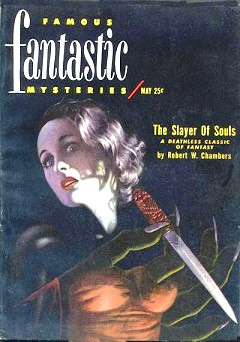
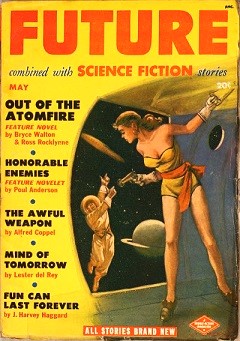
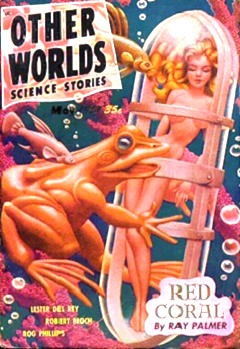
To view the entire list of weekly Old Time Radio episodes at Tangent Online, click here.